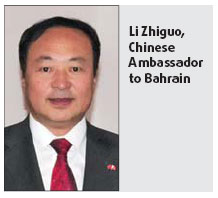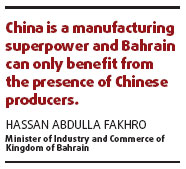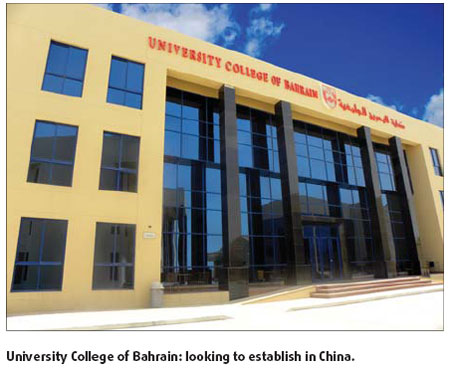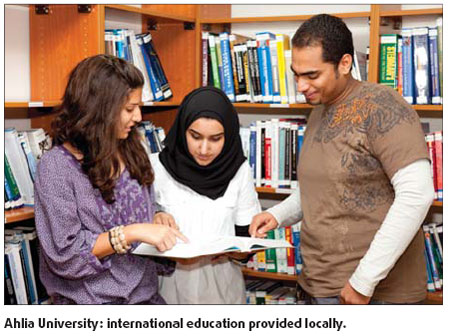
Through its solid commitment to an open, transparent, and market-driven commercial environment, the Ministry of Industry and Commerce (MOIC) is working hard to improve Bahrain's competitiveness and encourage inward investment.
Led by Industry and Commerce Minister Hassan Abdulla Fakhro, the MOIC is a key component of the Kingdom's long-term development plan called Vision 2030 and its drive to become a knowledge-based economy.
"By investing in a base in Bahrain, Chinese investors will be better placed to win new contracts and seize business opportunities in the region," he said.
"China is a manufacturing superpower and Bahrain can only benefit from the presence of Chinese producers, while Chinese manufacturers can benefit hugely from our stable economy and business environment from which they can target the greater Middle East region."

Headed by Esam Abdulla Fakhro, the Bahrain Chamber of Commerce & Industry (BCCI) has played an effective role in the development of the Kingdom's private commercial and industrial sectors through a range of initiatives and activities.
The BCCI plays a leading role in the development of the country's global trade relations and is also a one-stop shop for business services, data, and events, throughout the Bahraini business community.
"Bahrain has a very liberalized and open economy compared to its neighbors and we are working hard to strengthen our ties with other countries around the world," explained Fakhro.
"China is more important than ever to us and our arms are wide open for cooperation and joint ventures with Chinese companies. We offer a very investor-friendly environment and can enhance the Chinese economy by opening the Bahraini market for Chinese enterprises. China needs to diversify its presence and it makes a lot of sense for it to have an entity here in Bahrain in order to cater for the GCC market and north Africa."
Education is at the heart of Bahrain's Vision 2030 as officials seek to secure the country's future. The Economic Development Board is spearheading a program of enhancements, which include the launch of Bahrain Polytechnic - the region's first such facility.
Under the National Education Reform Initiative, Bahrain is overhauling and improving its entire education system through a series of measures aimed at ensuring children and young people receive the best quality education that is in line with the government's policy of Bahrainization. The Quality Assurance Authority for Education and Training will review scholastic performance on a regular basis and play a key role in the raising of standards to international levels.

Deputy Prime Minister Shaikh Mohammed Bin Mubarak Al Khalifa, who is also Chairman of the Education and Training Reform Committee, says he is delighted with the progress made in the education sector over the last few years.
"Bahrain is working very hard to further increase its income level through the development of the education and training fields," he said. "Vision 2030 grants this target the highest priority as it aims to expand the middle class and double the rate of income by the year 2030."
Established in 2002, the University College of Bahrain (UCB) blends a passion for learning with a commitment to innovation, teamwork, and creativity. Housed in modern facilities and offering 700 students the latest technology, the non-profit university boasts affiliations with the American University of Beirut and the Hong Kong University of Science and Technology.
Such has been the success of these strategic alliances, UCB is now searching for partners in China to form similar affiliations with leading entities. "We are looking to open a campus in China and would like Chinese organizations interested in establishing a joint venture for a world-class university in China to contact us," said UCB founder and president, Shaikh Khalid Bin Mohammed Al Khalifa. "The Chinese government is encouraging and supporting foreign universities in opening facilities so we want to explore these opportunities as demand is strong for the type of high quality courses that we provide."
Leading educational establishment Ahlia University has graduated more than 1,000 students since its foundation in 2001 as it works towards its goal of being one of the world's top 5,000 universities. Run as a trust rather than a private enterprise, Ahlia University has around 2,000 students who attend six colleges run by more than 130 academic staff. A new $120 million campus is now being designed, as the university looks to increase student numbers further, and set up fresh exchange programs with overseas universities, including some in China.
"We were the very first private university in Bahrain and our plan is to make sure the education sector grows by attracting students from GCC countries and the rest of the world," said Ahlia University president Abdulla Al Hawaj. "We want to work with universities around the world to exchange technology and knowledge and are looking to form successful partnerships with Chinese universities."

Bahrain's ICT sector is one of the largest and most innovative in the region due to the forward-thinking policies adopted by the government. Liberalization of the sector in 2003 had a huge impact on investment levels and the Kingdom's ICT networks now boast some of the best connectivity rates in the Gulf.
Chinese Ambassador Li Zhiguo believes the ICT industry is one area in which Bahrain and China can continue to forge successful partnerships for the benefit of the whole community. "There are three Chinese companies in the field of ICT working in Bahrain, of which two have selected the country for their regional bases," he said, adding such successes are repeated in other sectors as well.
"Chinese construction firms have entered Bahrain with projects worth more than $200 million, while in the education sector the Chinese government grants scholarships to Bahraini students each year, and invites Bahraini students to study at Chinese universities and academies."
Such outstanding progress in the ICT sector is shown by the strong performance of Bahrain Telecommunications Company (Batelco) since it was sold by the government to private investors in 2002. Batelco's next generation network is the latest addition to its impressive network and technology portfolio. The major project was completed with the help of Chinese ICT giant Huawei. "The success of our partnership with Huawei has been absolutely fabulous - they have delivered impressively and we have not been disappointed," said Peter Kaliaropoulos, Batelco CEO.
(China Daily 09/10/2009 page7)


